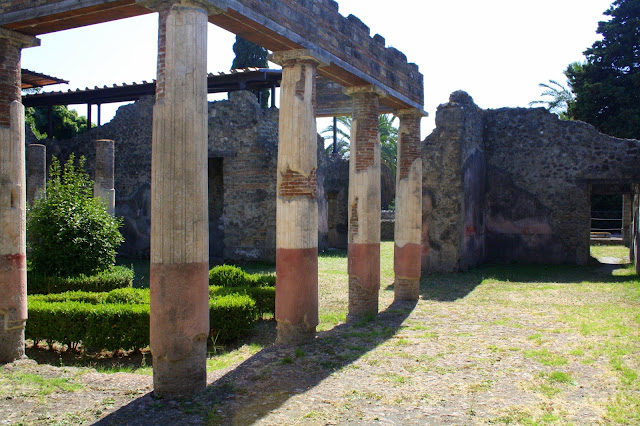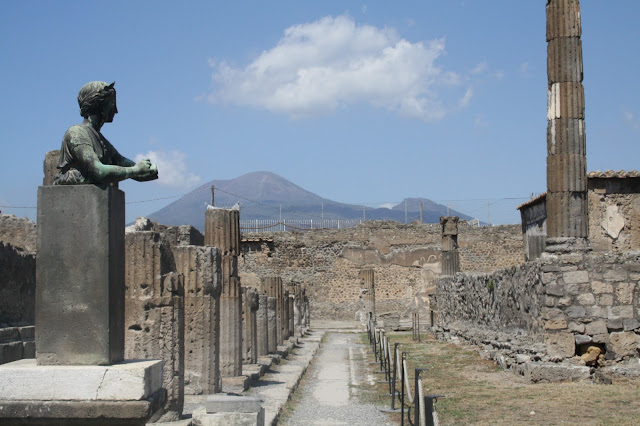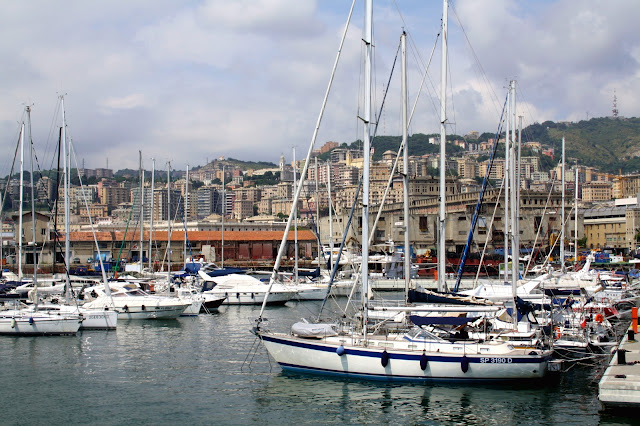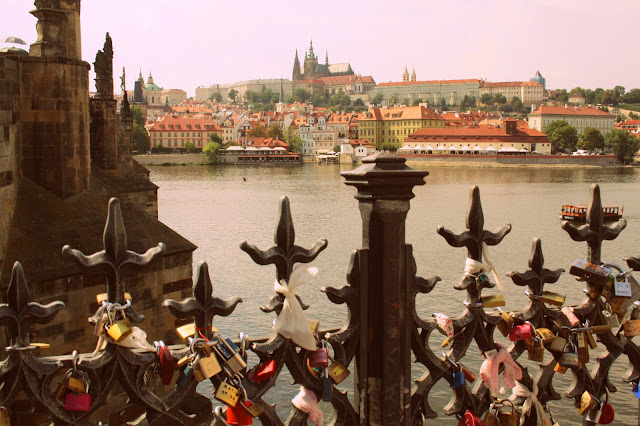"Byłem zdumiony pozostałościami tego miasta" - Percy Shelley w Pompejach/ "I was astonished at the remains of this city" - Percy Shelley in Pompeii
Trzy dni przed świętami Bożego Narodzenia 1818 roku, przebywający w Neapolu Percy Shelley zorganizował wycieczkę do ruin Pompejów. Towarzyszyły mu Mary Shelley i Claire Clairmont. "...Byliśmy w Pompejach, (…) Jestem zdumiony pozostałościami tego miasta; Nie miałem pojęcia, że przetrwało coś tak doskonałego" - opisywał pierwsze wrażenia w liście do Peacocka.
Three days before Christmas 1818, while spending the winter in Naples, Percy Shelley organized a trip to the ruins of Pompeii. He was accompanied by Mary Shelley and Claire Clairmont. "...We have been to see Pompeii, (...) I was astonished at the remains of this city; I had no conception of anything so perfect yet remaining - described his first impressions in a letter to Peacock.
"Weszliśmy do miasta od strony morza i jako pierwsze ujrzeliśmy dwa teatry; jeden wspanialszy od drugiego, usiane odłamkami białego marmuru, który obrobiony głęboką, odważną rzeźbą kiedyś tworzył siedzenia i gzymsy. Z przodu, między sceną a widownią, znajduje się okrągła przestrzeń, czasami zajmowana przez chór. Scena jest bardzo wąska, ale długa i oddzielona od tej przestrzeni wąską, równoległą do niej obudową, jak przypuszczam dla orkiestry. Po każdej stronie są loże konsulów, a nieco bardziej na północ, w teatrze w Herkulanum, znaleziono dwa posągi jeździeckie o godnym podziwu wykonaniu, zajmujące to samo miejsce, co wielkie lampy z brązu przy Drury Lane. Mówi się, że najmniejszy z teatrów był komiczny, chociaż wątpię. Gdy usiądziesz na widowni, z obydwu teatrów rozlega się wspaniała perspektywa."
"We entered the town from the side towards the sea, and first saw two theatres; one more magnificent than the other, strewn with the ruins of the white marble which formed their seats and cornices, wrought with deep, bold sculpture. In the front between the stage and the seats, is the circular space, occasionally occupied by the chorus. The stage is very narrow, but long, and divided from this space by a narrow enclosure parallel to it, I suppose for the orchestra. On each side are the consuls’ boxes, and below, in the theatre at Herculaneum, were found two equestrian statues of admirable workmanship, occupying the same place as the great bronze lamps did at Drury Lane, The smallest of the theatres is said to have been comic, though I should doubt. From both you see, as you sit on the seats, a prospect of the most wonderful beauty."
"Następnie idzie się przez starożytne ulice; są bardzo wąskie, a domy raczej małe, ale wszystkie zbudowane na godnym podziwu planie, zwłaszcza w tym klimacie. Pokoje zbudowane są wokół dziedzińca, a czasem dwóch, w zależności od wielkości domu. Pośrodku znajduje się fontanna, czasem otoczona portykiem, wsparta na żłobionych kolumnach z białego stiuku. Podłoga wyłożona jest mozaiką, czasem wykonaną na wzór liści winorośli, czasem w osobliwych figurach, mniej lub bardziej pięknych, zgodnie z rangą mieszkańca. Na wszystkich domach były obrazy, ale większość z nich została usunięta, aby udekorować królewskie muzea. jednak pozostały jeszcze małe skrzydlate figury i małe zdobienia o wykwintnej elegancji."
"You then pass through the ancient streets; they are very narrow, and the houses rather small, but all constructed on an admirable plan, especially for this climate. The rooms round a court, or sometimes two, according to the extent of the house. In the midst is a fountain, sometimes surrounded with a portico, supported on fluted columns of white stucco the floor is paved with mosaic, sometimes wrought in imitation of vine leaves, sometimes in quaint figures and more or less beautiful, according to the rank of the inhabitant. There were paintings on all, but most of them have been removed to decorate the royal museums. Little winged figures and small ornaments of exquisite elegance, yet remain."
"W jednym z domków można zobaczyć, jak urządzano pokoje sypialne - budowano małą sofę, na której kładziono poduszki; komnatę zdobią dwa obrazy - jeden przedstawiający Dianę i Endymiona, drugi Wenus i Marsa; jest też mała wnęka, w której znajduje się posąg domowego bożka. Podłoga ułożona jest z bogatej mozaiki z najrzadszych marmurów, agatu, jaspisu i porfiru; komnata wychodzi na marmurową fontannę i śnieżnobiałe kolumny, których belkowania porozrzucały podłogę portyku. Domy są jednopiętrowe, a mieszkania, choć nieduże, to bardzo wysokie."
"In one house you see how the bed-rooms were managed; - a small sofa was built up, where the cushions were placed, two pictures, one representing Diana and Endymion, the other Venus and Mars, decorate the chamber; and a little niche, which contains the statue of a domestic god. The floor is composed of a rich mosaic of the rarest marbles, agate, jasper, and porphyry; it looks to the marble fountain and the snow-white columns, whose entablatures strew strew the floor of the portico they supported. The houses have only one story, and the apartments, though not large are very lofty."
"Stąd przez inne portyki i labirynty ścian i kolumn (bo nie ma szans, że wszystko Ci szczegółowo opiszę) dotarliśmy do Forum. Jest to duży plac, otoczony wysokimi portykami ze żłobkowanymi kolumnami, niektóre połamane, niektóre z rozsypanymi pod nimi elementami belkowania. Świątynia Jowisza, Wenus (...), Trybunał i Sala Sprawiedliwości Publicznej, z lasami wysokich kolumn otaczają Forum. Dwa cokoły lub ołtarze ogromnych rozmiarów (bo czy były na nich posągi jeździeckie, czy też były ołtarzami świątyni Wenus, przed którą stoją, przewodnik nie mógł powiedzieć) zajmują dolny koniec Forum."
"Thence through other porticos and labyrinths of walls and columns, (for I cannot hope to detail everything to you) we came to the Forum. This is a large square, surrounded by lofty porticos of fluted columns, some broken, some entire their entablatures strewed under them. The temple of Jupiter, of Venus, (...), the Tribunal and the Hall of Public Justice, with their forests of lofty columns, surround the Forum. Two pedestals or altars of an enormous size, (for, whether they supported equestrian statues, or were the altars of the temple of Venus, before which they stand, the guide could not tell) occupy the lower end of the Forum.”
"Dzień był promienny i ciepły. Od czasu do czasu słyszeliśmy podziemny grzmot Wezuwiusza; jego odległe, głębokie dźwięki zdawały się wstrząsać powietrzem i światłem dnia, które przenikały nasze ramy, z ponurym i potężnym dźwiękiem. Ta scena była tym, co widzieli Grecy (wiesz przecież, że Pompeje były greckim miastem). Żyli w harmonii z naturą; a szczeliny ich niezrównanych kolumn były jakby portalami, przez które można było wpuścić ducha piękna, który ożywia ten wspaniały wszechświat, by odwiedzał tych, których inspirował. Jeśli takie są Pompeje, to czym były Ateny?
"At the upper end, supported on an elevated platform, stands the temple of Jupiter. Under the colonnade of its portico we sate, and pulled out our oranges, and figs, and bread, and medlars, (sorry fare, you will say) and rested to eat."
"The day was radiant and warm. Every now and then we heard the subterranean thunder of Vesuvius; its distant deep peals seemed to shake the very air and light of day, which interpenetrated our frames, with the sullen and tremendous sound. This scene was what the Greeks beheld (Pompeii, you know, was a Greek city). They lived in harmony with nature; and the interstices of their incomparable columns were portals, as it were, to admit the spirit of beauty which animates this glorious universe to visit those whom it inspired. If such is Pompeii, what was Athens? "















Komentarze
Prześlij komentarz